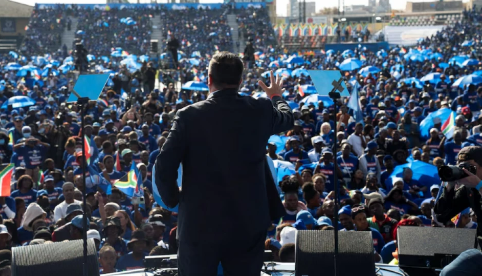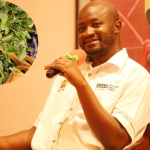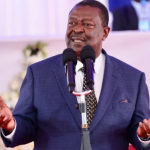Nick Searra, gazing out at Cape Town’s False Bay, acknowledges the efficiency of South Africa’s second-largest city, which serves as a stronghold for the opposition Democratic Alliance (DA).
However, Searra, a 44-year-old white Johannesburg native who relocated to Cape Town in 2022, expresses reluctance to see the DA, or its 48-year-old leader John Steenhuisen, assume leadership of the entire country.
Searra’s apprehension reflects a seismic shift in South African politics, as voters recently dismantled the majority long held by the African National Congress (ANC) since the end of white minority rule in 1994.
This outcome has compelled the ANC, led by the late Nelson Mandela’s party, to seek a coalition with a major rival.
Despite the DA’s modest performance in the recent elections, with only a one-percentage-point improvement since 2019, the party and Steenhuisen now find themselves in an unprecedented position.
Although the ANC remains the largest party, the DA, with 21.8% of the votes, is one of three parties with the influence to help form a new majority and potentially shape the nation’s future.
Steenhuisen sees this outcome as a realization of the DA’s long-held objective to break the ANC majority. However, the party grapples with an image problem, struggling to shed its perception as a party of affluent whites and demonstrate its alignment with the diverse makeup and aspirations of all South Africans.
According to political analyst Melanie Verwoerd, the DA’s challenge is not only racial but also ideological.
Steenhuisen advocates for economic liberalism, opposing the ANC’s racial quota system and advocating for looser labor laws, and a reduced government role in a country where millions depend on welfare.
Verwoerd suggests that while the DA may not intend to be perceived as a party of white privilege, its policies often result in such a perception, a claim the DA has repeatedly denied.
In contrast to South Africa’s broader economic challenges, including high unemployment and deteriorating infrastructure, the Western Cape province – controlled by the DA since 2009 – has shown notable progress.
It boasts the country’s lowest unemployment rate, with Cape Town serving as a major tourist hub and experiencing fewer power cuts compared to other regions. According to surveys, both the Western Cape province and Cape Town are widely regarded as the best-governed areas in South Africa.
Some residents, like Lauran Musgrave, a 31-year-old Cape Town resident and DA supporter, believe that the success of the Western Cape indicates that the party should govern the entire country.
However, in a city still marked by segregation, not everyone shares this sentiment. Theo Makhaphela, a 39-year-old black tour guide, acknowledges the improvements but highlights the ongoing challenges faced by residents, particularly in crime-ridden townships.
Solly Malatsi, a Black leader within the DA, notes that the party is gaining traction among Black voters, citing increased support in predominantly Black areas in the recent election. DA officials in the Western Cape claim that the government prioritizes spending on services for poorer areas over wealthy ones.
However, Zwelivelile ‘Mandla’ Mandela, the grandson of Nelson Mandela and a traditional tribal leader, remains skeptical. He argues that while the DA may tout successes, these achievements primarily benefit a select few, with many of the poorest residents still lacking access to basic necessities like clean water and proper sanitation.
When Phumzile Van Damme joined the DA, she believed she had found a political home. Elected to parliament in 2014 and appointed as the party’s national spokesperson, she was part of a wave of young Black lawmakers, including the new national leader, Mmusi Maimane, who were focused on making the DA more inclusive.
“It was an exciting time,” Van Damme recalled. “The messaging was really about building a home for all South Africans.”
However, after a disappointing 2019 election, where the DA lost a portion of its white Afrikaans-speaking voters, Van Damme noticed a shift in the party’s attitude.
“There was a fear of all these Black people coming in … Look at how much they’re changing the party,” she remarked.
Maimane, the DA’s first Black leader, resigned, citing internal resistance to his efforts to attract Black voters, and was replaced by Steenhuisen. The Black DA mayor of Johannesburg also stepped down, and several other Black DA lawmakers followed suit, including Van Damme.
Van Damme clarified that she does not consider the DA to be racist. Instead, she believes it reflects the broader racial struggles in the country, and as a Black lawmaker, she no longer felt welcome in the party.
Responding to Van Damme’s concerns, Solly Malatsi emphasized that the DA is committed to inclusion. Helen Zille pointed to the significant number of Black public representatives within the DA as evidence of this commitment.
However, criticism persists regarding the racial composition of the DA’s national leadership, where seven of the 13 members are white. Zille, who was once suspended from the party for controversial remarks about colonialism, defended the DA’s efforts towards diverse leadership but acknowledged ongoing criticism.
“The only party that’s demanded to have diverse leadership is the DA, and we’re the only one that does,” Zille asserted. “And we’re the only one that keeps on getting criticized.”



